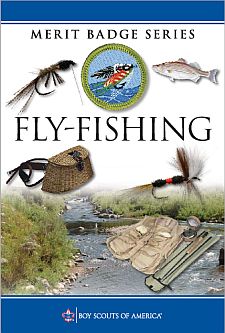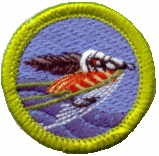- Do the following:
- Explain to your counselor the most likely hazards you may encounter while participating in fly-fishing activities and what you should do to anticipate, help prevent, mitigate, and respond to these hazards. Name and explain five safety practices you should always follow while fly-fishing.
- Discuss the prevention of and treatment for health concerns that could occur while fly-fishing, including cuts and scratches, puncture wounds, insect bites, hypothermia, dehydration, heat exhaustion, heatstroke, and sunburn.
- Explain how to remove a hook that has lodged in your arm.
- Demonstrate how to match a fly rod, line and leader to achieve a balanced system. Discuss several types of fly lines, and explain how and when each would be used. Review with your counselor how to care for this equipment.
- Demonstrate how to tie proper knots to prepare a fly rod for fishing:
- Tie a backing to the arbor of a fly reel spool using the an arbor knot
- Attach Tie backing to the fly line using the a nail knot
- Attach a leader to the fly line using the needle knot a nail knot, or a loop-to-loop connection
- Add a tippet to a leader using a surgeon's knot or a loop-to-loop connection or blood knot
- Tie a fly onto the terminal end of the leader using the an improved clinch knot
- Explain how and when each of the following types of flies is used: dry flies, wet flies, nymphs, streamers, bass bugs, poppers , and saltwater flies. Tell what each one imitates. Tie at least two types of the flies mentioned in this requirement.
- Demonstrate the ability to cast a fly 30 feet consistently and accurately using both overhead and roll cast techniques.
- Go to a suitable fishing location and what fish may be eating both above and beneath the water's surface. Look for flying insects and some that may be on or beneath the water's surface. Explain the importance of matching the hatch.
- Do the following:
- Explain the importance of practicing Leave No Trace techniques. Discuss the positive effects of Leave No Trace on fishing resources.
- Discuss the meaning and importance of catch and release. Describe how to properly release a fish safely to the water.
- Obtain and review a copy of the regulations affecting game fishing where you live or where you pan to fish. Explain why they were adopted and what is accomplished by following them.
- Discuss what good outdoor sportsmanlike behavior is and how it relates to anglers. Tell how the Outdoor Code of the Boy Scouts of America relates to a fishing enthusiast, including the aspects of littering, trespassing, courteous behavior, and obeying fishing regulations.
- Catch at least one fish. If regulations and health concerns permit, clean and cook a fish you have caught. Otherwise, acquire a fish and cook it.
- If regulations and health concerns permit, clean and cook a fish you have caught. Otherwise, acquire a fish and cook it. (You do not need to eat your fish.)
BSA Advancement ID#:
136
Requirements last updated in:
2019
Pamphlet Publication Number:
35900
Pamphlet Stock (SKU) Number:
35824
Pamphlet Revision Date:
2014
|
|||||||
Page updated on: November 18, 2021









